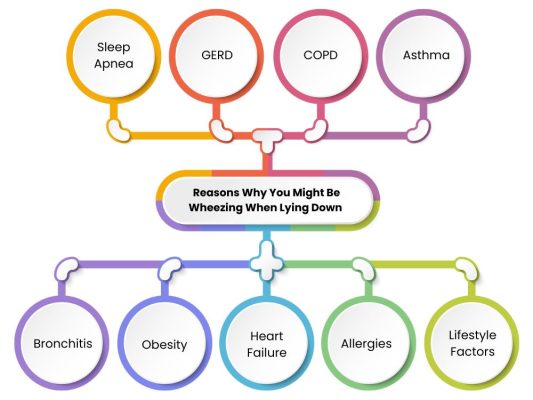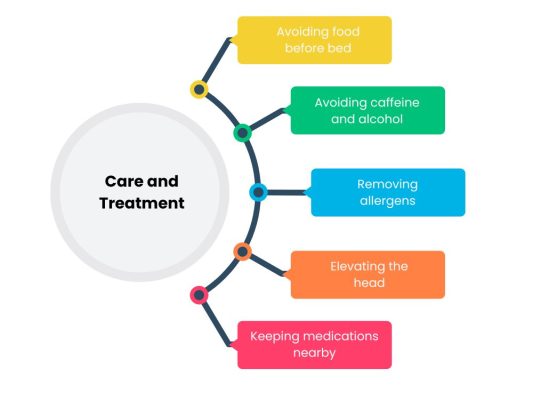Wheezing when lying down is more than just a bothersome sound; it’s a signal from your body that something might be amiss with your respiratory system. This phenomenon often strikes at night, disrupting sleep and leaving you gasping for breath.
But who is most likely to experience this unsettling condition? While wheezing can affect anyone, it tends to be more common in older adults and individuals with pre-existing respiratory conditions like asthma or chronic obstructive pulmonary disease (COPD).
Interestingly, genetics can also play a role, as a family history of respiratory issues may increase the likelihood of developing wheezing. However, when it comes to gender, studies show that men and women are almost equally susceptible, although the underlying causes may differ between the sexes.
What is Wheezing & How Does It Sound?
Wheezing is a high-pitched whistling sound that occurs when you breathe, often most noticeable during exhalation. This sound is produced when air flows through narrowed or obstructed airways, usually in the lungs or bronchi.
The narrowing can result from inflammation, mucus buildup, or constriction of the airways due to various underlying conditions. Wheezing can range from a soft, subtle sound to a loud, shrill noise that can be heard without a stethoscope.
It’s a telltale sign that your airways are struggling to move air in and out, and it shouldn’t be ignored.
Why Do I Wheeze When I Lay Down?
Wheezing when lying down can be particularly concerning and is often tied to the position of your body, which affects how your lungs and airways function. The shift in position can cause fluids to settle, airways to narrow, or pressure to build up in your chest, leading to that unsettling wheeze. Whether you’re lying on your left side, right side, or flat on your back, the underlying reasons for your wheezing may vary.
- Rattling in chest when lying down: This could indicate fluid buildup in your lungs or a congested airway, often linked to conditions like pneumonia or heart failure.
- Wheezing when lying down on the left side: This might be related to issues like heart failure, where fluid accumulates in the lungs due to the pressure on the left side of your body.
- Wheezing when lying down on the right side: This could be due to asthma or other respiratory conditions where the airways become more restricted when you lie on your right side, causing difficulty in breathing.
Reasons Why You Might Be Wheezing When Lying Down
Wheezing when lying down can be caused by a variety of underlying health conditions or lifestyle factors. Understanding these potential triggers can help you identify the root cause and seek appropriate treatment. Below are some common reasons why you might experience wheezing when you lie down:
- Sleep Apnea: This condition causes intermittent breathing pauses during sleep, leading to a temporary closure of airways, which can result in wheezing.
- Gastroesophageal Reflux Disease (GERD): GERD can cause stomach acid to flow back into the esophagus, irritating the airways and leading to wheezing, particularly when lying flat.
- Chronic Obstructive Pulmonary Disease (COPD): COPD, which includes emphysema and chronic bronchitis, can cause the airways to narrow or become inflamed, leading to wheezing, especially in certain positions.
- Asthma: Asthma causes the airways to become inflamed and constricted, which can worsen when lying down, triggering wheezing.
- Bronchitis: Inflammation of the bronchial tubes can lead to mucus buildup, causing wheezing that may be exacerbated by lying down.
- Obesity: Excess weight can put pressure on the lungs and airways, making it difficult to breathe and causing wheezing when lying down.
- Heart Failure: In heart failure, fluid can build up in the lungs, leading to difficulty breathing and wheezing, especially when lying flat.
- Allergies: Allergens like dust mites or pet dander can trigger respiratory symptoms, including wheezing, particularly in bed.
- Lifestyle Factors: Smoking, exposure to environmental pollutants, or a sedentary lifestyle can all contribute to wheezing when lying down.
How Do I Know If My Wheezing Is Serious?
Determining the seriousness of your wheezing involves paying attention to its frequency, intensity, and accompanying symptoms. If your wheezing is persistent, worsening, or associated with other symptoms like shortness of breath, chest pain, or swelling in your legs, it could indicate a more serious underlying condition, such as heart failure or a severe respiratory issue.
Additionally, if wheezing interferes with your daily activities or sleep, or if it is accompanied by symptoms like bluish skin or lips (cyanosis), it’s crucial to seek medical attention immediately.
While occasional wheezing can be related to less severe conditions like allergies or mild asthma, any sudden or severe changes should be evaluated by a healthcare provider to rule out more serious concerns.
Care and Treatment
Wheezing when lying down can be uncomfortable and disruptive to your sleep, but there are several steps you can take to alleviate the symptoms and improve your rest. Here are some practical tips to help you sleep better with wheezing:
- Avoiding food before bed: Eating close to bedtime can worsen GERD symptoms, leading to increased wheezing. Try to finish your meals at least two to three hours before lying down.
- Avoiding caffeine and alcohol: Both caffeine and alcohol can relax the muscles around your airways, making wheezing more likely. Avoid these substances, especially in the evening.
- Removing allergens: Dust mites, pet dander, and other allergens in your bedroom can trigger wheezing. Keep your sleeping environment clean by washing bedding regularly, using hypoallergenic pillowcases, and keeping pets out of the bedroom.
- Trying decongestants: Over-the-counter decongestants can help open up your airways, making it easier to breathe and reducing wheezing. However, use them sparingly and consult with a healthcare provider if needed.
- Elevating the head: Propping up your head with pillows or using a wedge pillow can help prevent stomach acid from flowing back into your esophagus and reduce pressure on your lungs, making it easier to breathe.
- Keeping medications nearby: If you have a condition like asthma or COPD, ensure your inhaler or other prescribed medications are within reach in case you experience wheezing during the night.
How Do You Treat Wheezing When You Lay Down?
Treating wheezing when lying down depends on the underlying cause of the symptoms. For conditions like asthma or COPD, using prescribed inhalers or bronchodilators can help open up the airways and ease breathing. If GERD is the culprit, lifestyle changes such as adjusting your diet, avoiding late-night meals, and sleeping with your head elevated can reduce symptoms.
In cases where allergies are the cause, using antihistamines or decongestants, and ensuring your sleeping environment is free from allergens, can be beneficial. For more serious conditions like heart failure, following your doctor’s treatment plan, which may include medications or lifestyle modifications, is crucial.
Regardless of the cause, if wheezing persists or worsens, it’s important to consult a healthcare provider for a tailored treatment approach.
Why Do I Wheeze But My Lungs Are Clear?
Wheezing with clear lungs can be perplexing, as it suggests that the wheezing may not be directly related to lung congestion or obstruction. Instead, this type of wheezing could be due to conditions affecting the airways outside the lungs, such as vocal cord dysfunction, where the vocal cords do not open correctly, causing a whistling sound.
Another possibility is GERD, where acid reflux irritates the airways, leading to wheezing without actual lung involvement. In some cases, anxiety or stress can also trigger wheezing, even when the lungs are clear, as the body responds to stress with shallow, rapid breathing.
Bottom Line
Wheezing on exhale when lying down can be a sign of various underlying health issues, from respiratory conditions like asthma or COPD to lifestyle factors such as GERD or allergies. Understanding the potential causes and taking steps to address them, whether through lifestyle adjustments, medications, or consulting with a healthcare provider, can help you manage your symptoms and breathe easier.
If your wheezing persists or worsens, it’s important to seek professional medical advice to ensure proper diagnosis and treatment.



